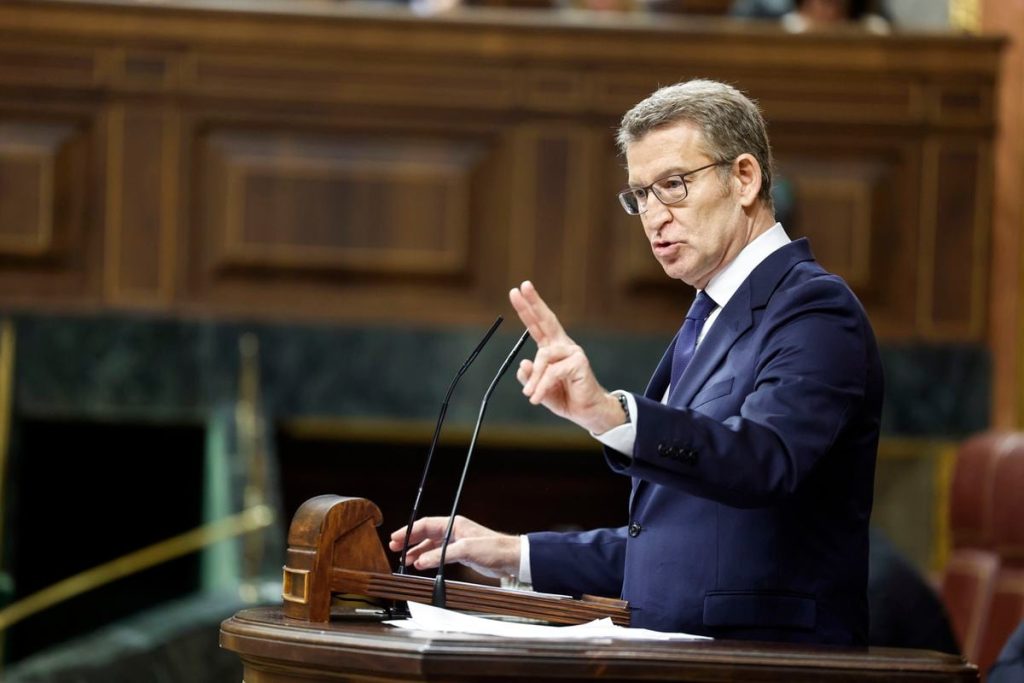Alberto Núñez Feijóo has finally clarified the position of the Popular Party (PP) regarding the recognition of the State of Palestine, after days of confusion and doubts within the party. This comes after former Prime Minister José María Aznar opposed the recognition of Palestine, putting pressure on the current leader of the PP to take a stand. Feijóo had previously avoided this issue to prevent giving an advantage to Prime Minister Pedro Sánchez, who is leading the initiative to recognize Palestine. However, faced with increasing pressure, Feijóo decided to address the topic during a debate and stated that the PP supports the solution of the two States, echoing the party’s position from 2014.
Feijóo criticized Sánchez’s initiative as a “coarse brushstroke” and accused him of being driven by a desire for protagonism. He cautioned that recognizing a state without the necessary conditions for viability could harm the Palestinians. Feijóo suggested that other countries of influence should also recognize the State of Palestine before Spain does. Sánchez, in turn, criticized the PP leader for following Aznar’s lead. Despite the differences within the party, Feijóo’s clarification of the PP’s position has settled the issue for now. The party’s official stance remains supportive of the two-State solution, but the timing and conditions for recognition are crucial.
The PP leadership was initially divided on the issue, with some members more aligned with Aznar’s position, as in the case of Elías Bendodo, a member of Feijóo’s team. The party hierarchy is also critical of Sánchez’s focus on foreign policy matters, accusing him of using international trips as a way to divert attention from domestic issues. Feijóo himself prefers to concentrate on domestic politics, such as the Koldo case and calls for amnesty, which he believes can be more damaging to the PSOE. Feijóo has always been uncomfortable with foreign policy matters and prefers to focus on issues closer to home to maintain a strong political stance.
During the parliamentary debate with Sánchez, Feijóo also brought up conspiracy theories, such as suggesting that Spain’s position on Western Sahara changed because of alleged mobile phone espionage by Morocco. Feijóo criticized Sánchez for sacrificing Spain’s interests for personal matters and insinuated collusion between the Spanish government and the president of Venezuela based on a meeting between the Venezuelan vice president and a Spanish minister. Feijóo also criticized Sánchez’s stance on exhuming the remains of the former dictator Franco, using a similar phrase that former PP leader Pablo Casado had used to question the exhumation process. Feijóo’s comments during the debate underscore the ongoing tensions within the PP regarding foreign policy decisions and their implications.
In conclusion, Alberto Núñez Feijóo’s recent intervention on the issue of recognizing the State of Palestine has clarified the Popular Party’s position, aligning it with the two-State solution while emphasizing the importance of timing and conditions for recognition. The internal divisions within the party, particularly regarding foreign policy matters, have come to the fore, with some members supporting former Prime Minister José María Aznar’s stance. The ongoing debate reflects broader disagreements within the PP over foreign policy issues and how they impact party coherence and political strategy. Feijóo’s handling of the situation highlights his focus on domestic politics and his efforts to maintain a strong stance in the face of external pressures and internal divisions within the party.


